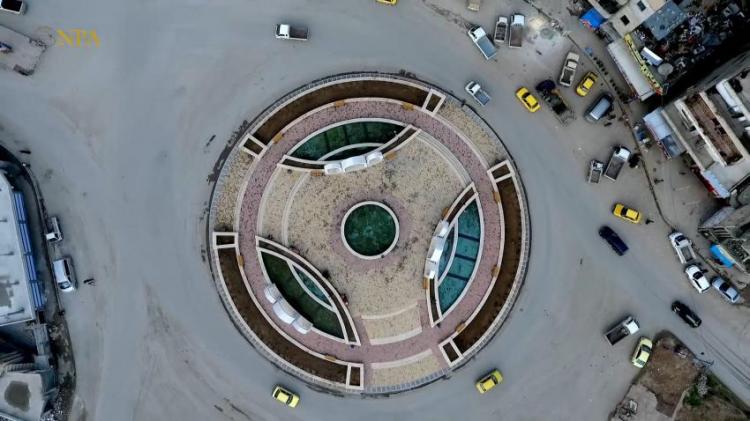Raman Ali\ Mustafa Al-Khalil – Raqqa
Raqqa city is famous for its distinguished urban system , besides, it is one of the largest cities on the Euphrates basin after Deir Al-Zour, in addition to the fact that it was a point of transport between the interior cities and the Syrian north, and from it to Turkey and Europe.
Raqqa was known for its squares and green spaces, which are now almost destroyed upon the recent fighting in the city, between the Syrian Democratic Forces backed by the international coalition and the militants of the “Islamic State”.
One of the most famous landmarks in the city is Al-Na’eem square, located in the center of the city, within a point connecting the old neighborhoods with modern buildings in the western part of the city.
The name “Al-Na’eem” overshadowed the entire area surrounding the square, where it was small park for the people of the city before the start of the Syrian crisis in March 2011. The square had a water fountain , at the time, flowing into a small lake that took most of its area.
From “Bliss” to “Hell”
Al-Na’eem” square turned to a frightening place for most of the residents after the control of the “Islamic State” militants, in 2013. Therefore, the people started calling it “Hell” square, because the organization of the Islamic State used to hang heads ,of slaughtered people, separated from the body, around that place.
The most prominent executions carried out by members of the organization in the square, was hanging the heads of soldiers of the “17th Division” , after they were captive in a battle in the province of Raqqa in 2014. “17th Division” belong to the Syrian government forces.
The extreme fear of the people was accompanied by great popular discontent in Raqqa city, but the organization’s ability to control the region , in term of security, and its intolerance to all those who face and criticize it or do not apply their instructions, which were known as “very cruel,” created a reality in which the organization has legalized everything for itself.
Through the implementation of such practices, the organization was spreading terror among civilians of Raqqa, since the square is one of the most crowded places in the city.
It did not last long before the organization’s militants were expelled by the Syrian Democratic Forces in 2017, followed by the violent battles that destroyed the city’s infrastructure. The Civil Council, formed by the Self-Administration in cooperation with some international organizations, began the work of rubble removing and reconstruction of the city.
Rehabilitation of the Square.
The rehabilitation of Al-Na’eem square was one of the main reconstruction plans in the city, where the early recovery team (a civil society organization) repaired it and completed its rehabilitation in February, after it was prepared by the people municipality of the city council. The process of lighting the surroundings of the square, was the last step in the rehabilitation that lasted for four months, at a cost of / 140 / thousand dollars, according to project supervisors.
Engineer Isma’il Al-Ilka, the project manager, said that the idea of rehabilitation was “a moral idea of Raqqa symbol and linking it to its heritage, when it was the capital of the Abbasi state,” it took more than 100 days to complete the work. He added.
The renewed square has fountains on three sides and a central one, some green spaces and a sidewalk. Al-Ilka mentioned that the tunnels dug by the organization’s militants under the square, were one of the major obstacles faced in rehabilitation process.
Awad Hassan, one of Raqqa civilians, said that Al-Na’eem is a symbol of civilization for the people, referring to the situation of the square during the control of the organization, saying, ” passing the way through the square, at that time, was terrifying because of hanging heads.”
Zuhair Al-Hasan, also from Raqqa, said, “After the formation of the Self-Administration, it was possible to come to the square without any fear of torn heads hanged, like the days of the organization.”
Ahmed Al-Muhammad, a resident of Raqqa, said: “The view of the Square, nowadays, makes you feel comfortable.”

